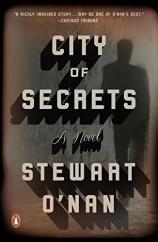City of Secrets
Review
City of Secrets
One hallmark of Stewart O'Nan's fine literary career is the sheer diversity of his subject matter. This is a writer whose output includes a quiet novel about the travails of an elderly woman (EMILY ALONE), a ghost story about teenagers killed in an automobile accident (THE NIGHT COUNTRY) and, most recently, a re-creation of the final days in Hollywood of F. Scott Fitzgerald (WEST OF SUNSET). And that's just a sampling of his writing's breadth.
Another distinctive feature of O'Nan's body of work has been a talent for producing compact fiction that's as satisfying as much more substantial works. Among those novels are LAST NIGHT AT THE LOBSTER, the story of the unremarkable final day of a Connecticut mall restaurant, and THE ODDS, a portrait of a middle-aged couple on a quixotic trip to Niagara Falls to save their failing finances.
CITY OF SECRETS, the story of Jewish anti-British activists in Jerusalem in the immediate aftermath of World War II, marks a radical departure from any subject he's treated before and serves as a showcase of his talent for brevity. In fewer than 200 pages, O'Nan produces a taut plot that features enough action to satisfy thriller fans, while confronting profound questions like the morality of terrorist violence and the emotional scars borne by Holocaust survivors.
"...an intense, mature novel that raises some provocative questions about political violence and the morality of those who engage in it."
O'Nan's protagonist is a Latvian survivor named Brand, a man who's lost all of his family at the hands of the Nazis. He dismisses his own survival with a passing thought: "By chance, he lived." His dreams are haunted by memories of his late wife Katya, along with those of a fellow concentration camp inmate, Koppelman, beaten to death by a Nazi guard as Brand watched. Working as a merchant seaman, he's made his way to Jerusalem, "a puzzle box built of symbols," where, under the name Jossi Jorgenen, he drives a Peugeot taxi through the city's narrow streets. "His old life was over, his new one a shambles and a sham," he concludes, with the melancholy that's his principal character trait.
Eva, a Lithuanian immigrant, is Brand's lover. She's a former actress who works as a high class call girl, driven to her assignations at the King David Hotel and elsewhere by Brand. They spend their evenings sharing candlelit dinners and listening to Benny Goodman and Billie Holiday records in Eva's apartment, but Brand longs for a deeper relationship he understands is impossible.
Brand and Eva share another activity: their membership in an active cell of the Haganah, a paramilitary organization that's part of the resistance to British rule in Palestine. The Haganah is the most moderate of these resistance fighters, but their temperance yields to the more violent tactics of the Irgun (headed by Menachem Begin, later prime minister of Israel) and the Stern Gang. The activities of these groups, which include kidnappings and assassinations, are well-documented. The most spectacular was the bombing of Jerusalem's King David Hotel, home to the Secretariat, the administrative offices of the British Mandate, on July 22, 1946, an attack that claimed 91 lives.
Unlike a pure thriller writer, O'Nan is as much interested in exploring the moral compromises imposed on Brand, Eva and the other members of their cell as he is in portraying their daring exploits. Brand, for one, "wanted the revolution --- like the world --- to be innocent, when it had never been," a vain hope, he sees, as the activities of his cell --- the bombing of a power station and a train robbery among them --- become increasingly daring and violent.
Brand must come to terms with the moral calculus that balances the use of violence that kills and injures civilians, or the execution of a cell member suspected of informing on other members of the group, with the higher good of establishing the State of Israel. "How did you kill and still call yourself righteous?" he asks, posing this unanswerable question to himself. O'Nan is not in the business of making moral judgments for his characters, and so we, like Brand, are left to reflect on whether acts of terrorism in aid of worthy goals are ever justified.
While O'Nan sacrifices much historical background and exposition to the demands of his propulsive plot, the novel doesn't suffer as a consequence. In fact, this spare story may prompt some readers, unfamiliar with the actual events it portrays, to seek out more information about this dramatic and complex period in the history of the Middle East. Even without that context, CITY OF SECRETS is an intense, mature novel that raises some provocative questions about political violence and the morality of those who engage in it.
Reviewed by Harvey Freedenberg on May 6, 2016
City of Secrets
- Publication Date: April 25, 2017
- Genres: Fiction, Historical Fiction, Historical Thriller, Suspense, Thriller
- Paperback: 208 pages
- Publisher: Penguin Books
- ISBN-10: 0143108948
- ISBN-13: 9780143108948





